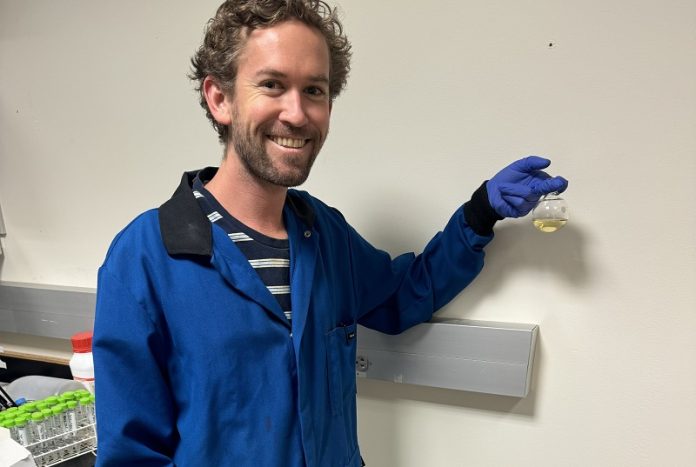
A team of chemists at UC Santa Cruz has developed a breakthrough way to produce biodiesel from waste oils, making the process simpler and more energy-efficient.
Biodiesel is a renewable fuel that can power trucks, trains, and ships, helping reduce carbon emissions from diesel fuel, which is currently a major source of pollution.
This new method could make biodiesel production more attractive for industrial sectors that rely on heavy-duty diesel engines.
In 2022, the U.S. transportation sector alone used about 3 million barrels of diesel per day, representing 75% of the country’s total diesel consumption and producing around 10% of its energy-related CO₂ emissions.
While electric vehicles are gaining popularity, most fleets and shipping industries still depend on diesel.
Biodiesel is a promising alternative, but traditional biodiesel production is complex, costly, and energy-intensive, which has limited its adoption.
The UC Santa Cruz team, led by Ph.D. student Kevin Lofgren, has found a way to turn used vegetable oil into biodiesel with fewer steps and at lower temperatures.
Their process uses a chemical called sodium tetramethoxyborate (NaB(OMe)₄), which effectively reacts with waste oil to produce biodiesel.
This compound is unique because it allows the fuel to be easily separated from other byproducts by simply pouring them off, making purification easier and faster.
Another key advantage of this method is that it works at mild temperatures, around 40°C (104°F), which saves both energy and money. Additionally, one of the byproducts can be reused to regenerate the most expensive ingredient in the process, making it even more cost-effective over time.
“Biodiesel has always interested me,” Lofgren says. “When I began experimenting with this new material, I wanted to see if it could break down fats in oil to create biodiesel—and everything flowed from there.”
Current biodiesel production methods often use high temperatures and pressures and create soap as a byproduct, making the fuel harder to purify. Some approaches also use palm oil, which leads to deforestation and harms the environment.
By contrast, the new method uses waste oil and mild heating, avoiding the high energy costs and environmental damage associated with traditional processes.
According to Professor Scott Oliver, a co-author of the study, “Our method uses waste oil and low heat, compared to petroleum refineries, which consume large amounts of energy and cause pollution.”
The UC Santa Cruz method transforms about 85% of waste oil into biodiesel, meeting nearly all standards for use in heavy-duty vehicles and machinery. While the water content is slightly above industry limits, the researchers believe that as the process scales up, it will meet all standards.
“This method is simple and cost-effective,” says Lofgren. “It’s affordable, and regenerating the starting material reduces costs even more in the long run.”
Professor Bakthan Singaram, co-author of the study, adds that the process could be easily used in non-industrial settings, such as farms, where fuel is essential. This innovation could make biodiesel a viable alternative for powering the trucks, boats, and machinery essential to the economy, without needing a full-scale refinery.
Source: UC Santa Cruz.



